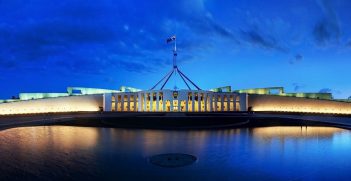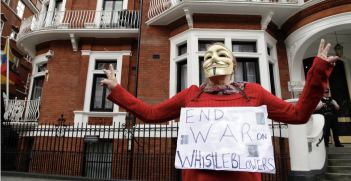23 July: The Week in Australian Foreign Affairs

This week in Australian foreign affairs: Brisbane 2032, APEC Virtual Informal Leaders’ Meeting, the attribution of malicious cyber activity to China, the third Japan-Australia Ministerial Economic Dialogue, and more.
On 21 July, Prime Minister Scott Morrison announced that Australia will host the 2032 Olympics for the third time and Paralympics for the second time after Brisbane secured the International Olympic Committee vote. Morrison said that the announcement “marks an important leap forward for Australia as we look toward major events that lock in economic growth and social benefits that will echo for years to come.” Morrison delivered an address to the International Olympic Committee earlier that day, where he stated that, “our hope is that the benefits of the Games will extend beyond Australia … Hosting the 2032 Games would provide a foundation to expand programs that provide sporting opportunities for [our Indo-Pacific neighbours].”
Morrison attended the APEC Virtual Informal Leaders’ Meeting on 17 July. In his address to the meeting, noted that “we cannot have a recovery [from the COVID-19 pandemic] without a free and open Indo-Pacific. And that means respect for the rule of law. It means regional stability and security. It means the region being able to operate free of coercion and influence.” Morrison also stated that “it’s an urgent issue to ensure that the WTO’s appellate body is restored and fully functional … the WTO plays an absolutely essential role in policing the rules of world trade and ensuring that no country can be subject to economic coercion.” In a media statement about the meeting, he noted that “it is a critical time for Australia to engage with regional partners to promote free trade facilitation, in particular for vaccines and essential goods; build momentum for strengthening the multilateral trading system; and secure a sustainable and inclusive recovery.”
On 19 July, Minister for Foreign Affairs Marise Payne, alongside Minister for Home Affairs Karen Andrews and Minister for Defence Peter Dutton delivered a joint statement where they announced that Australia joins international partners in attributing malicious cyber activity to China. The Ministers noted that “the Australian Government has determined that China’s Ministry of State Security exploited vulnerabilities in the Microsoft Exchange software to affect thousands of computers and networks worldwide, including in Australia.” They further stated that “China must adhere to the commitments it has made in the G20, and bilaterally, to refrain from the cyber-enabled theft of intellectual property, trade secrets and confidential business information with the intent of obtaining competitive advantage.”
Minister for Trade Dan Tehan and his Japanese counterpart, Mr Kajiyama Hiroshi, co-chaired the third Japan-Australia Ministerial Economic Dialogue in Tokyo on 15 July. In a joint statement, the Ministers noted the “growing strength of the Special Strategic Partnership between the two countries; a partnership characterised by shared values and a commitment to a free, open, inclusive, and resilient Indo-Pacific to meet evolving challenges, including recovery from the devastating impacts of COVID-19.”
On 16 July, Tehan issued a media release following meetings with Japanese Government and tourism industry stakeholders, where he “[promoted] Australian tourism and [discussed] the importance of a strong two-way travel market between the countries.” Tehan stated that the Morrison Government “is working to strengthen our relationships, and broaden our appeal, with the Japanese people.”
Payne issued a joint media release with her Belgian, Malaysian, Dutch and Ukrainian counterparts to acknowledge the seventh anniversary of the downing of Malaysia Airlines flight MH17 on 17 July. The Ministers said that “it is imperative that we remain steadfast in our commitment to pursuing truth, justice and accountability.”
On 21 July, Australia and the Republic of Korea held the seventh Australia-ROK Joint Economic Committee meeting via video link. This was the “first such meeting since both sides agreed to re-energise the forum at the 2019 2+2 Foreign and Defence Ministers Meeting.” The Australian delegation was led by Acting Deputy Secretary Indo-Pacific Group, Department of Foreign Affairs and Trade, Elly Lawson. The Korean delegation was led by Deputy Minister for Economic Affairs, Ministry of Foreign Affairs, Mr Seong-ho Lee. Australia and Korea “noted the importance of continuing to strengthen multilateral institutions, including the G7+, G20 and the WTO, and exchange information on [the Regional Comprehensive Economic Partnership] and [the Comprehensive and Progressive Agreement for Trans-Pacific Partnership].”
Isabella Keith is an undergraduate student at the Australian National University studying Law and Politics, Philosophy and Economics. She is currently an intern at the AIIA National Office.
This article is published under a Creative Commons License and may be republished with attribution.





